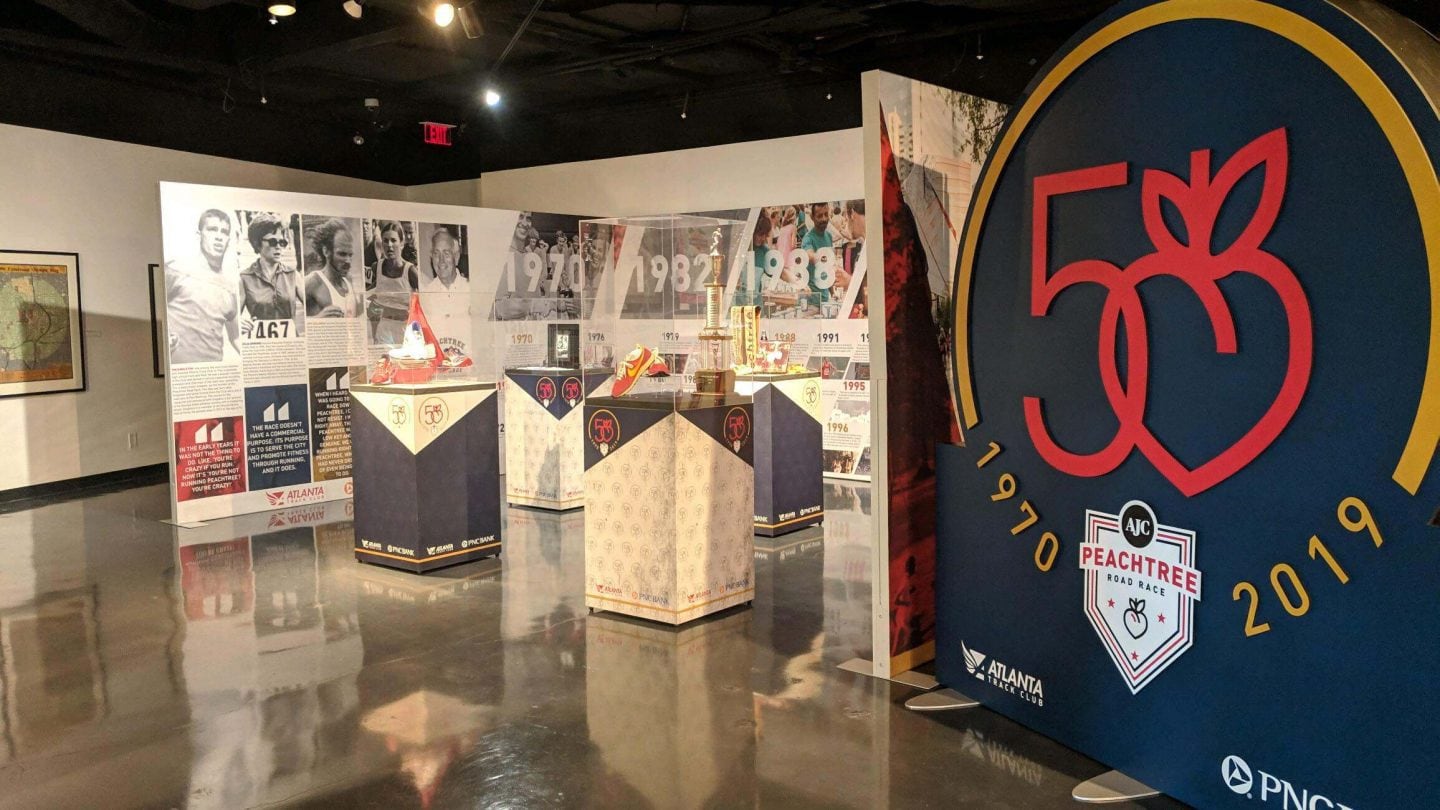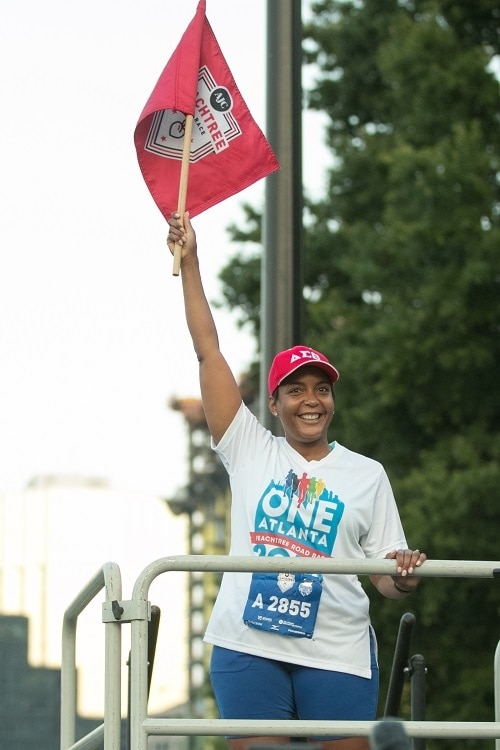
Clyde Partin Jr. was just 14 years old, when he and his father stopped by the cinder track at Emory University in June 1970. He doesn’t recall why they stopped, but he does remember Tim Singleton approaching them and extending an invitation for “a little race down Peachtree” he’d planned for July 4th.
The AJC Peachtree Road Race has grown dramatically over the years and is excited to celebrate the 50th running on July 4, 2019. Partin, who along with his father is one of the “Original 110” finishers, is looking forward to this historic moment.
As the milestone approaches, Atlanta Track Club is celebrating in a number of ways—one of which is 20 feet long, 8 feet high, and 50 years deep. 50 Years of the Peachtree presented by PNC Bank is a traveling display currently on view at Atlanta History Center. The display highlights a vivid timeline of race history and rarely-displayed artifacts from the event. Atlanta History Center is excited to host the traveling display through June 22, after which it will transfer to the Peachtree Health & Fitness Expo on July 2 and 3 at the Georgia World Congress Center.
Former Mayor Shirley Franklin running Peachtree Road Race.
“What Makes the Peachtree Special. . .”
Mayor Shirley Franklin once called Peachtree Road Race the one thing Atlanta wouldn’t be the same without. But what about “the Peachtree” makes it so special?
Although there have been tweaks to the start and finish, the run down Peachtree Street—the artery of both the city and the race—endures. Winning the first race was Jeff Galloway, a man who would later help bring in friends like Frank Shorter, Bill Rodgers, Don Kardong, and four-time Olympic gold medalist Lasse Viren to compete. With a combination of Olympian participants and the 1970s running boom, the AJC Peachtree Road Race has grown to 60,000 participants since its founding. It now boasts the titles of “largest road race in the United States” and “largest 10K in the world.”
But it’s likely that the Peachtree became what it is today through something less tangible: The race and the city are at heart one and the same.
Olympian and author, Jeff Galloway, running 1976 Peachtree Road Race.
“It’s the people,” said Galloway, who after winning the inaugural Peachtree went on to become a 1972 Olympian and author. “Atlanta has a long tradition of people wanting to work together for the common good and people wanting to come together with energy to make something good happen.”
If the Peachtree reflects the city in its friendliness, energy, and “can-do” attitude, it does so even more with its spirit of inclusion. It may be won by an Olympic medalist or world champion, and often is, but the real race does not belong to the swift.
After finishing 2018’s race, Mayor Keisha Lance Bottoms said, “What makes the Peachtree special is, it’s Atlanta.”
“For one morning,” cracked AJC reporter Steve Hummer, “a community made up of transients [comes] together as Atlantans for a few hours to sweat. If people should’ve found something better to do with their Fourth of July mornings, they don’t seem to do it.”
Dorothy and Frank
The feeling of community surrounding the race can be traced back to Julia Emmons, who led Atlanta Track Club and the Peachtree for 22 years from 1985 to 2006. From the first day of her tenure, Emmons decided her job was to pay attention to serving the community. She delegated total responsibility for the field of elite athletes—which routinely featured many of the best from across the globe—in order to focus entirely on the pack. Or, rather, on a pair of representative runners she thought of as “Dorothy and Frank.”
“You can’t imagine 25,000 people, but you can imagine two people times 12,000,” she said. “If we change the water stops, how does that affect Dorothy and Frank? This is very real. Running Peachtree to them is a big deal.”
In her first year at the helm, Emmons was asked afterward if she realized there had been crying children in the race. She ran every year thereafter, tending on foot to her flock. “I care about each and every person in the race,” she said. “And if the children were crying, I wanted to know why.” Her findings helped lead to the establishment of Peachtree Junior, a separate event for younger children.
But when changes were needed, she realized, they needed to come gradually, not all at once. “It has to feel the same,” she explained, “even as it changes.”
AJC Peachtree Road Race start line.
Shirley Franklin, Atlanta’s former mayor, took a serious view. “It’s on our main street and very few things happen on that street that are as joyous or inclusive,” she said. “Nobody worries about who you are or where you came from or how you got there.”

Mayor Keisha Lance Bottoms at 2018 AJC Peachtree Road Race.
Or, as former mayor Keisha Lance Bottoms’ 2018 race T-shirt proclaimed: One Atlanta. “Running down Peachtree and to have the world’s largest 10K, 60,000 people out here … nothing says Atlanta more. And then to have the diversity, I would be surprised if you find that anywhere else in America.”
